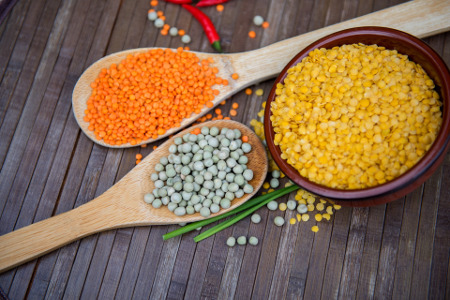5 Ways to Naturally Ease Menopause Symptoms
Isn’t it nice when we can talk about topics that used to be taboo openly, and get valuable information and insights. Menopause is one of those topics – with all woman eventually going through it, we spoke with Dr Min Yeo, Functional Medicine General Practicioner about natural ways to ease Menopause Symptoms. Here is what Dr Yeo had to say:
From about 45 our female reproductive hormone production begins to change, marking a new milestone in our lives.[1] This period before menopause, peri-menopause, begins somewhere between 45-55 years for most women[2] and is usually the time when menopausal symptoms are heightened.[3] Whilst this change in life is something all women share, a recent survey by Flordis shows premenopausal women are still reluctant to discuss this milestone with their older (and wiser) rolemodels. [4] This may be due to the fact that more than half of pre and post menopausal women are worried about going through menopause, mainly due to the side effects, as shown in the same survey.[5] The majority of women surveyed (95 percent!) also wanted natural options to help manage their symptoms. [6] Menopausal symptoms do cause distress for many women,[7] however the severity and range of symptoms will varying between individuals,[8] and luckily women have many options to help manage the symptoms.[9]
Hot flushes, mild anxiety, night sweats, sleeplessness and even mood swings are all symptoms of menopause and a result of the fluctuating and decreased oestrogen coursing through our body.[10] Hot flushes and night sweats are common symptoms of menopause with 80% of menopausal women experiencing the associated spontaneous sweating and somewhat disagreeable body heating, 20% of which describe these symptoms as severe.[11] Women experiencing hot flushes and sleeplessness are also more likely to experience mood imbalances and symptoms of mild anxiety, other common symptoms contributing to an unpleasant transition to menopause.[12] Interestingly the mood swings in menopausal women differ to those of child-bearing age, with menopausal women being more likely to have increased levels of sleep disturbance, aggression and and fatigue. [13]
Research now confirms the importance of a comprehensive approach for a smooth menopause transition, including a number of natural management approaches:[14] [15]
Boost your diet with soy and phytoestrogen rich foods
Phytoestrogens mimic the action of our naturally produced estrogen and hence help our body cope with the reduced estrogen production in menopause.[16] Many plant-based foods contain phytoestrogens with the richest source being soy-based foods, such as tofu, tempeh, and edamame. Flaxseeds[17], legumes (like chickpeas and lentils), peas, quinoa, barley, alfalfa and clover sprouts, as well as mug bean sprouts are also good sources of phytoestrogens.[18] [19] Try to incorporate a range of these foods into most of your daily meals.


Use herbs shown to help with menopause
Actaea racemosa, also known as black cohosh, is regarded as one of the most important herbal medicines in helping support the management of menopause transition symptoms, with a long history of its use.[20] [21] You may wish to consider a clinically proven extract of Actaea racemosa, that has been shown to significantly relieve a range of menopause symptoms, such as hot flushes and sweating, disturbed sleep, nervous tension, irritability and headaches and joint pain.[22] [23] [24] Clinical trials and studies of over 1,000 women have shown menopause symptom improvement as early as 1 month with increasing relief shown over 3 to 9 months.[25] [26] [27]
Avoid Common Triggers
It can help to avoid common triggers that can make hot flushes worse, things like coffee[28], alcohol[29], anxiety, stress and spicy food.[30] Too much coffee can also contribute to feelings of anxiety or stress-like symptoms for some people.[31] Along with a healthy diet, reducing coffee and alcohol can help reduce your hot flushes and help with menopausal symptoms.[32]


Have a positive attitude and support the menopausal transition
Having a positive attitude towards menopause has been shown to reduce symptoms.[33] Cognitive therapy, mindfulness meditation and exercise helps support a positive mood and help reduce some menopausal symptoms.[34] Speak to your healthcare professional about the best options to help support your individual needs. Beauty Over 40 note – I can attest to having a positive attitude – I didn’t dread menopause, rather looked at it as something naturally occurring, and this has really helped me through the process so far.
Maintain Exercise
Regular physical exercise has been shown to be effective in managing hot flushes and help manage stress and mood. Exercise also has a number of other benefits including helping to maintain healthy weight, which can reduce hot flushes, and support cardiovascular health.[35]

Try incorporating these good health measures into your daily routine to help you make your menopausal transition easier. It’s also a good idea to discuss your individual needs and health options with a qualified healthcare professional, especially if you are struggling with any of the symptoms of menopause or otherwise. Remember, menopause is a natural process and these small measures can help make a difference.
To find out more about black cohosh, visit: https://www.flordis.com.au/ingredients/actaea-racemosa/.
Note: Black cohosh can harm the liver in some people. Contains lactose. Always read the label. Follow the directions for use. If symptoms persist, talk to your healthcare professional.
Thank you Dr Yeo – I have certainly learned something from these tips – I do some of these, but need to try others.
Have you tried any of these tips, does something else work for you? Feel free to share your tips with our other readers in the comments section below.
Article References:
[1] Menopause Management: Jean Hailes; [Available from: https://www.jeanhailes.org.au/news/managing-menopause-dont-let-symptoms-of-menopause-reduce-your-quality-of-life
[2] Ibid
[3] Ibid
[4] Flordis consumer research: Menopause, 2020
[5] Ibid
[6] Ibid
[7] Panay N, Briggs P, Kovacs GT. Managing the Menopause: Cambridge University Press; 2015.
[8] Ibid.
[9] Ibid.
[10] Menopause Management: Jean Hailes; [Available from: https://www.jeanhailes.org.au/news/managing-menopause-dont-let-symptoms-of-menopause-reduce-your-quality-of-life
[11] Ibid.
[12] Mood problems at Menopause. Australasian Menopause Society. https://www.menopause.org.au/hp/information-sheets/570-mood-problems-at-menopause
[13] Ibid.
[14] Menopause Management: Jean Hailes; [Available from: https://www.jeanhailes.org.au/news/managing-menopause-dont-let-symptoms-of-menopause-reduce-your-quality-of-life
[15] Mood problems at Menopause. Australasian Menopause Society. https://www.menopause.org.au/hp/information-sheets/570-mood-problems-at-menopause
[16] Phytoestrogens: Jean Hailes; [Available from: https://www.jeanhailes.org.au/health-a-z/healthy-living/nutrients/phytoestrogens.
[17] Ibid.
[18] Ibid.
[19] Ibid.
[20] Joseph E. Pizzorno JND, Michael T. Murray N. Textbook of Natural Medicine: Elsevier Health Sciences; 2012. pp. 1894-1895
[21] Bone K, Mills S. Principles and Practice of Phytotherapy – E-Book: Modern Herbal Medicine: Elsevier Health Sciences; 2013. pp. 427-439
[22] Lopatka Et Al., 2007
[23] Schellenberg et al. Evidence-Based Complementary and Alternative Medicine (2012)
[24] Drewe et al. Phytomedicine 2013; 20:659-666
[25] Lopatka Et Al., 2007
[26] Schellenberg et al. Evidence-Based Complementary and Alternative Medicine (2012)
[27] Drewe et al. Phytomedicine 2013; 20:659-666
[28] Wachamo HL. Review on Health Benefit and Risk of Coffee Consumption. Medicinal and Aromatic plants. 2017;06:1-12.
[29] Menopause Management: Jean Hailes; [Available from: https://www.jeanhailes.org.au/news/managing-menopause-dont-let-symptoms-of-menopause-reduce-your-quality-of-life
[30] Ibid.
[31] Wachamo HL. Review on Health Benefit and Risk of Coffee Consumption. Medicinal and Aromatic plants. 2017;06:1-12.
[32] Menopause Management: Jean Hailes; [Available from: https://www.jeanhailes.org.au/news/managing-menopause-dont-let-symptoms-of-menopause-reduce-your-quality-of-life
[33] Ibid.
[34] Ibid.


